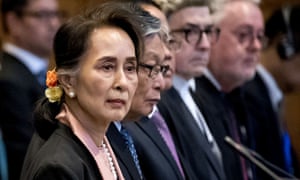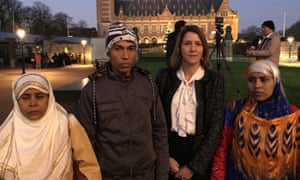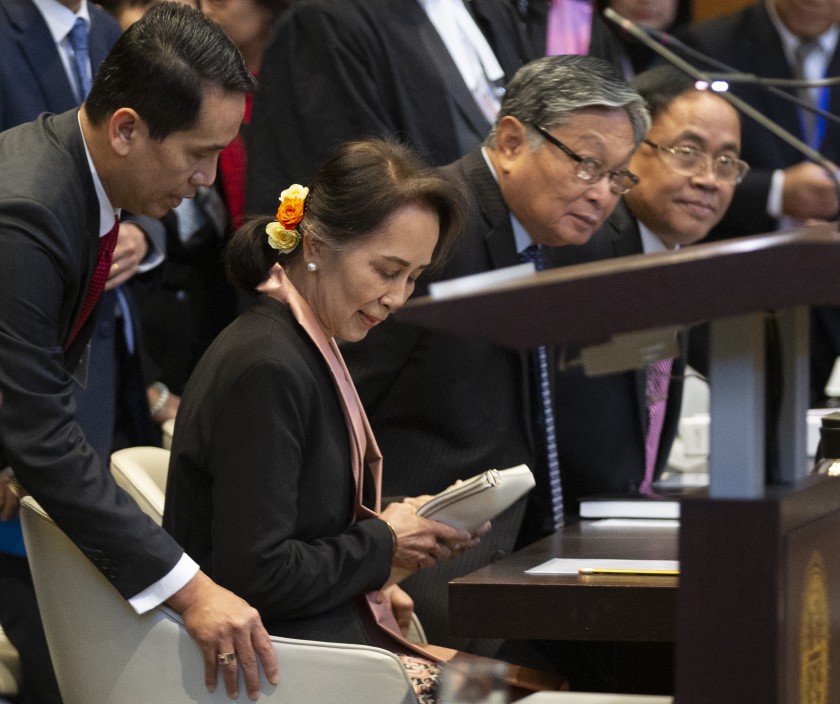Aung San Suu Kyi in court as genocide hearing opens in The Hague

The international community’s failure to act over allegations of genocide perpetrated by Myanmar’s military against the Rohingya people is a “stain on the collective conscience” of the world, the international court of justice in the Hague has been told.
Abubacarr Marie Tambadou, the Gambia’s attorney general and justice minister, said as he opened his country’s case against Myanmar: “I stand before you to awaken the conscience of the world and arouse the voice of the international community. In the words of Edmund Burke, ‘The only thing necessary for the triumph of evil is for good men to do nothing’.”
Myanmar’s leader, Aung San Suu Kyi, who was listening in court, is expected to defend her country’s military against the genocide accusations on Wednesday.
Tambadou said: “Another genocide is unfolding right before our eyes yet we do nothing to stop it. This is a stain on our collective conscience. It’s not only the state of Myanmar that is on trial here, it’s our collective humanity that is being put on trial.”
Before dawn, a long queue had assembled outside the Peace Palace in the Dutch city to witness the first of three days of hearings that will focus attention on military clearance operations in 2017 against the Rohingya Muslim minority, which forced 700,000 people to flee across the border to neighbouring Bangladesh.
Aung San Suu Kyi’s decision to fly to the Netherlands has proven popular in Myanmar, a mainly Buddhist country that considers the Rohingya to be illegal immigrants and denies them citizenship.
She has the status of official “agent” for Myanmar at the hearing, meaning she is the designated leader of her country’s delegation. On Tuesday, she sat in the front row, her hands resting on a table. As a list of atrocities was read out to the court, she stared ahead at the raised bank of judges in front of her, her face expressionless.
Once internationally feted as a human rights champion, Myanmar’s state counsellor has suffered a rapid fall of grace over what the UN has called her “complicity” in the military clearances.
The contrast has been repeatedly drawn between Aung San Suu Kyi’s 1991 Nobel peace prize win and 15 years spent under house arrest, and her present position as chief denier that any ethnic violence has been perpetrated against the Rohingya.
She will not address what is known as the “world court” until Wednesday morning, when she is expected to argue that the military operations in question were a legitimate counter-terrorism response to attacks by Rohingya militants.
The case has been brought by the Gambia, a predominantly Muslim west African state that alleges Myanmar has breached the 1948 genocide convention enacted following the Holocaust.
The Gambia’s claim states that Myanmar has perpetrated “manifest” contraventions of the convention through the acts of its military, and continues to do so.
Those acts, the court was told, have included “extrajudicial killings, rape or other forms of sexual violence, burning of homes and destruction of livestock … calculated to bring about a destruction of the Rohingya group in whole or in part.”
Aung San Suu Kyi’s alleged personal responsibility for the military’s clearance operations was raised by Paul Reichler, a US attorney speaking on behalf of Gambia. He showed the court a photograph of billboards that appeared across the country in which she appeared in front of three of Myanmar’s leading generals above the caption: “We stand with you.”
Reichler added: “This shows – it can only have been intended to show – that they are all in it together and that Myanmar has absolutely no intention of holding its emboldened military leadership to account.”
Professor Philippe Sands QC, the last lawyer to make submissions for Gambia, told the court that the International Court of Justice is “the ultimate guardian of the [1948] Genocide Convention; it’s on you the eyes of the world are turned.”
Sands quoted from the UN fact-finding mission which said that Aung San Suu Kyi had not used her “de facto power or moral authority to stem or prevent the unfolding events or to protect the civilian population”.
He recalled that the court last ordered provisional measures in Bosnia to prevent genocide in 1993 and that had been followed two years later by the Srebrenica massacre. Preventative, emergency measures – known as ‘provisional measures’ – must be imposed by the court to protect the remaining Rohingya population, he urged.
“There has been a deliberate attempt to prevent access to evidence of genocide,” Sands told the court. “Grave violence and genocidal acts … [have been committed] in breach of the convention … There should be far-reaching provisional measures.”
Among those in court were several Rohingya survivors who had flown in from Kutupalong refugee camp, the largest outside Cox’s Bazar in Bangladesh.
Hamida Khatun, Yousuf Ali and Hasina Begum were supported by the human rights organisation Legal Action Worldwide, which was founded by a former UN investigator of the violence, Antonia Mulvey.

“This is a momentous occasion. They have travelled a long way to be here,” Mulvey said outside the court. “They are seeking justice and this is the first and most important step.
“They are the representatives from their community. For them it’s a powerful moment to see Aung San Suu Kyi present in court. They have been shocked to see her defending the military.
“Aung San Suu Kyi did nothing to stop the killing. She could have asked for help from the international community at the time. And now, as the final insult, she’s defending the army’s behaviour in court.”
Khatun, 50, is a leader of the Shanti Mohila, a group of 400 Rohingya women in the Kutupalong camp. Her family and friends were murdered in the 2017 security operations.
Begum, 22, was attacked by Myanmar soldiers. Ali, 46, was beaten and sexually tortured by Myanmar police in detention because he was accused of supporting the Arakan Rohingya Salvation Army, which the Myanmar army describes as a terrorist organisation.
Before the hearing, Akila Radhakrishnan of the New York-based Global Justice Center, said: “The international community is many years too late on taking action in Myanmar, but this case represents the first hope in decades for the Rohingya and other persecuted ethnic groups in the country.
Indiscriminate killings, widespread rape and sexual violence, arbitrary detention, and torture have been everyday reality in Myanmar for far too long. The court has an opportunity with this case to help end it all.”
Nicholas Bequelin of Amnesty International said: “There is a mountain of evidence that the Myanmar military has committed crimes under international law and grave human rights violations against the Rohingya population.
“Yet the government of Myanmar – including Aung San Suu Kyi – has continued to dismiss, downplay or otherwise deny these accusations.”

